Related Research Articles

A ballad is a form of verse, often a narrative set to music. Ballads derive from the medieval French chanson balladée or ballade, which were originally "dance songs". Ballads were particularly characteristic of the popular poetry and song of Britain and Ireland from the Late Middle Ages until the 19th century. They were widely used across Europe, and later in Australia, North Africa, North America and South America.
Capital punishment, also known as the death penalty and formerly called judicial homicide, is the state-sanctioned killing of a person as punishment for actual or supposed misconduct. The sentence ordering that an offender be punished in such a manner is known as a death sentence, and the act of carrying out the sentence is known as an execution. A prisoner who has been sentenced to death and awaits execution is condemned and is commonly referred to as being "on death row". Etymologically, the term capital refers to execution by beheading, but executions are carried out by many methods, including hanging, shooting, lethal injection, stoning, electrocution, and gassing.

"Barbara Allen" is a traditional folk song that is popular throughout the English-speaking world and beyond. It tells of how the eponymous character denies a dying man's love, then dies of grief soon after his untimely death.
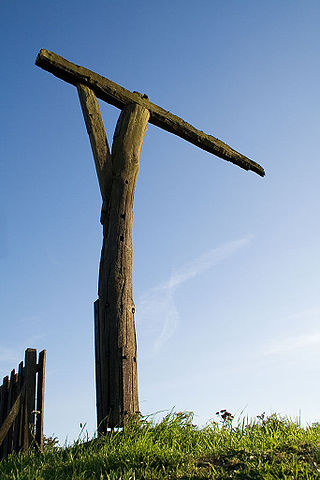
Gibbeting is the use of a gallows-type structure from which the dead or dying bodies of criminals were hanged on public display to deter other existing or potential criminals. Occasionally, the gibbet was also used as a method of public execution, with the criminal being left to die of exposure, thirst and/or starvation. The practice of placing a criminal on display within a gibbet is also called "hanging in chains".
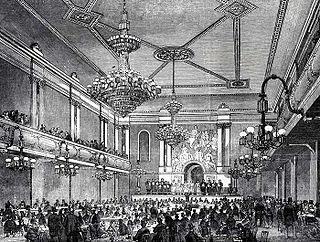
Early British popular music, in the sense of commercial music enjoyed by the people, can be seen to originate in the 16th and 17th centuries with the arrival of the broadside ballad as a result of the print revolution, which were sold cheaply and in great numbers until the 19th century. Further technological, economic and social changes led to new forms of music in the 19th century, including the brass band, which produced a popular and communal form of classical music. Similarly, the music hall sprang up to cater for the entertainment of new urban societies, adapting existing forms of music to produce popular songs and acts. In the 1930s, the influence of American Jazz led to the creation of British dance bands, who provided a social and popular music that began to dominate social occasions and the radio airwaves.
"The Daemon Lover" – also known as "James Harris", "A Warning for Married Women", "The Distressed Ship Carpenter", "James Herries", "The Carpenter’s Wife", "The Banks of Italy", or "The House-Carpenter" – is a popular ballad dating from the mid-seventeenth century, when the earliest known broadside version of the ballad was entered in the Stationers' Register on 21 February 1657.
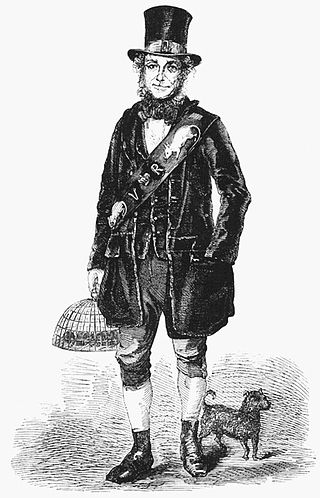
A rat-catcher is a person who kills or captures rats as a professional form of pest control. Keeping the rat population under control was practiced in Europe to prevent the spread of diseases, most notoriously the Black Death, and to prevent damage to food supplies. In modern developed countries, such a professional is otherwise known as a pest control operative or pest exterminator.
Capital punishment is a legal penalty in China. It is applicable to offenses ranging from murder to drug trafficking. Executions are carried out by lethal injection or by shooting. A survey conducted by TheNew York Times in 2014 found the death penalty retained widespread support in Chinese society.
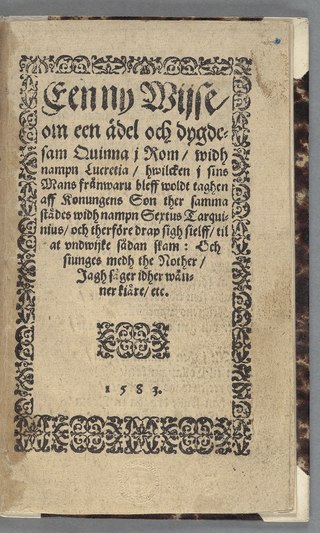
A broadside is a single sheet of inexpensive paper printed on one side, often with a ballad, rhyme, news and sometimes with woodcut illustrations. They were one of the most common forms of printed material between the sixteenth and nineteenth centuries, particularly in Britain, Ireland and North America because they are easy to produce and are often associated with one of the most important forms of traditional music from these countries, the ballad.

A broadside is a large sheet of paper printed on one side only. Historically in Europe, broadsides were used as posters, announcing events or proclamations, giving political views, commentary in the form of ballads, or simply advertisements. In Japan, chromoxylographic broadsheets featuring artistic prints were common.

Sin Bandera is a Mexican romantic ballads duo consisting of Mexican singer-songwriter Leonel Garcia and Argentine singer-songwriter Noel Schajris. They formed in Mexico City in 2000. They became one of the most popular artists after their eponymous debut studio album Sin Bandera was released on November 20, 2001.

Street literature is any of several different types of publication sold on the streets, at fairs and other public gatherings, by travelling hawkers, pedlars or chapmen, from the fifteenth to the nineteenth centuries. Robert Collison's account of the subject describes street literature as the "forerunner of the popular press".

Deterrence in relation to criminal offending is the idea or theory that the threat of punishment will deter people from committing crime and reduce the probability and/or level of offending in society. It is one of five objectives that punishment is thought to achieve; the other four objectives are denunciation, incapacitation, retribution and rehabilitation.
Capital punishment is a legal penalty in Iran. The list of crimes punishable by death includes murder; rape; child molestation; homosexuality; drug trafficking; armed robbery; kidnapping; terrorism; burglary; incest; fornication; adultery; sodomy; sexual misconduct; prostitution; plotting to overthrow the Islamic government; political dissidence; sabotage; arson; rebellion; apostasy; blasphemy; extortion; counterfeiting; smuggling; recidivist consumption of alcohol; producing or preparing food, drink, cosmetics, or sanitary items that lead to death when consumed or used; producing and publishing pornography; using pornographic materials to solicit sex; capital perjury; recidivist theft; certain military offences ; "waging war against God"; "spreading corruption on Earth"; espionage; and treason. Iran carried out at least 977 executions in 2015, at least 567 executions in 2016, and at least 507 executions in 2017. In 2018 there were at least 249 executions, at least 273 in 2019, at least 246 in 2020, at least 290 in 2021, at least 553 in 2022, at least 834 in 2023, and at least 226 so far in 2024. In 2023, Iran was responsible for 74% of all recorded executions in the world.
"Geordie" is an English language folk song concerning the trial of the eponymous hero whose lover pleads for his life. It is listed as Child ballad 209 and Number 90 in the Roud Folk Song Index. The ballad was traditionally sung across the English speaking world, particularly in England, Scotland and North America, and was performed with many different melodies and lyrics. In recent times, popular versions have been performed and recorded by numerous artists and groups in different languages, mostly inspired by Joan Baez's 1962 recording based on a traditional version from Somerset, England.

The Red Barn Murder was a 1827 murder in Polstead, Suffolk, England. A young woman, Maria Marten, was shot dead by her lover William Corder at the Red Barn, a local landmark. The two had arranged to meet before eloping to Ipswich. Corder sent letters to Marten's family claiming that she was well, but after her stepmother spoke of having dreamed that Maria had been murdered, her body was discovered in the barn the next year.
Capital punishment in Saudi Arabia is a legal punishment, with most executions in the country being carried out by decapitation (beheading) – Saudi Arabia being the only country in the world to still use the method. In 2022, recorded executions in Saudi Arabia reached 196, the highest number recorded in the country for any year over the last three decades.
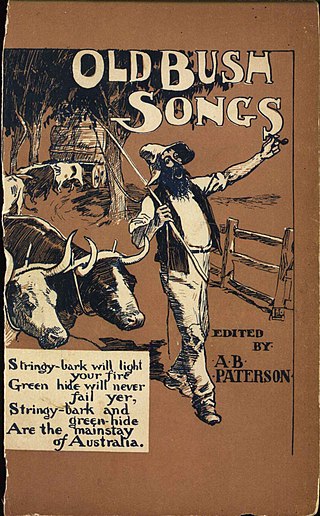
The bush ballad, bush song, or bush poem is a style of poetry and folk music that depicts the life, character and scenery of the Australian bush. The typical bush ballad employs a straightforward rhyme structure to narrate a story, often one of action and adventure, and uses language that is colourful, colloquial, and idiomatically Australian. Bush ballads range in tone from humorous to melancholic, and many explore themes of Australian folklore, including bushranging, droving, droughts, floods, life on the frontier, and relations between Indigenous and non-Indigenous Australians.
Transportation ballads are a genre of broadside ballads that concern the transportation of convicted criminals, originally to the American colonies and later to penal colonies in Australia. They were intended to serve as warnings of the hardships that come with conviction and thereby a deterrent against criminal behavior. Transportation ballads were published as broadsides—song sheets sold cheaply in the streets, at markets and at fairs. Many have passed into the folk tradition.
Capital punishmentin Kuwait is legal. Hanging is the method of choice for civilian executions. However, shooting is a legal form of execution in certain circumstances.
References
- ↑ "Singing the News of Death: Song in Early Modern European Execution (1500-1900) | ARC Centre of Excellence for the History of Emotions". www.historyofemotions.org.au. Retrieved 2021-04-07.
- ↑ "About Execution Ballads · Execution Ballads". omeka.cloud.unimelb.edu.au. Retrieved 2021-04-07.
- ↑ "BALLADS". HARNESSING THE POWER OF THE CRIMINAL CORPSE. Retrieved 2021-04-07.
- ↑ McIlvenna, Una (6 August 2015). "Death penalty: execution ballads were the news reports and tweets of a bloody era". The Conversation. Retrieved 2021-04-07.
- ↑ McIlvenna, Una (September 23, 2016). "Disaster, Death and the Emotions in the Shadow of the Apocalypse, 1400–1700". Research Gate. pp. 275–294. Retrieved April 7, 2021.